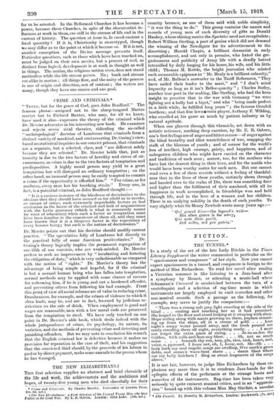CRIME AND CRIMLNALS.*
"THERE, but for the grace of God, goes John Bradford." The famous phrase—assigned not to the sharp-tongued Marian martyr but to Richard Baxter, who may, for all we know, have used it also—expresses the theory of the criminal which Dr. Herder advocates in his interesting new book. He examines and rejects seven rival theories, ridiculing the so-called anthropological" doctrine of Lombroso that criminals form a distinct variety of mankind, and controverting Dr. Goring's view, based on statistical inquiries in our convict prisons, that criminals are a separate, but a selected, class, and " are different solely because they are selected." Dr. Mercier holds that, just as insanity is due to the two factors of heredity and stress of cir- cumstances, so crime is duo to the two factors of temptation and predisposition. A highly moral person may yield to a great temptation but will disregard an ordinary temptation ; on the other hand, an immoral person may be easily tempted to commit a crime if the opportunity is afforded him." "For crime, as for madness, every man has his breaking strain." Every one, in fact, is a potential criminal, as John Bradford thought:— "it is a curious instance of the blindness of doctrinaires to the obvious that they should have rosined so far afield as to invoke, as causes of crime, such extremely improbable factors as had sanitation in the house of the criminal and lack of acquaintance with the Latin grammar (which is what is commonly meant by want of education) when such a factor as temptation must have been familiar in the experience of them all, and they must have known that it is a frequent factor in the experience of every human being; but such is the nature of doctrinaires."
Dr. Mercier points out that his doctrine should modify current practice. "The speculative folly of Lombroso led directly to the practical folly of some American penitentiaries." Dr. Goring's theory logically implies the permanent segregation of one-fifth of our convicts, who aro weak-minded. Dr. Mercier prefers to seek an improvement by " inculcating and fostering the obligation of duty," which is very unfashionable as compared with the notion of "rights." Dr. Herder's theory has the advantage of being simple and hopeful, for if the criminal is but a normal human being who has fallen into temptation, normal methods may be applied with some chance of success for redeeming him, if be is young and not a hardened offender, and preventing others from following his bad example. FERIA this point of view all social reforms arc of value in reducing crime, Drunkenness, for example, and the crimes of violence to which it often leads, may be, and are in fact, lessened by judicious re- strictions on the sale of drink. When employment is good and wages are reasonable, men with a low moral code are preserved from the temptation to steal. We have only touched on one point in Dr. Mercier's able book, which deals indeed with the whole jurisprudence of crime, its psychology, its nature, its varieties, and the methods of preventing crime and detecting and punishing offenders. But we may note in conclusion his remark that the English criminal law is defective because it makes no provision for reparation in the case of theft, and his suggestion that the convicted thief should, by the proceeds of his labour in gaol or by direct payment, make some amends to the person whom he has wronged.






































 Previous page
Previous page